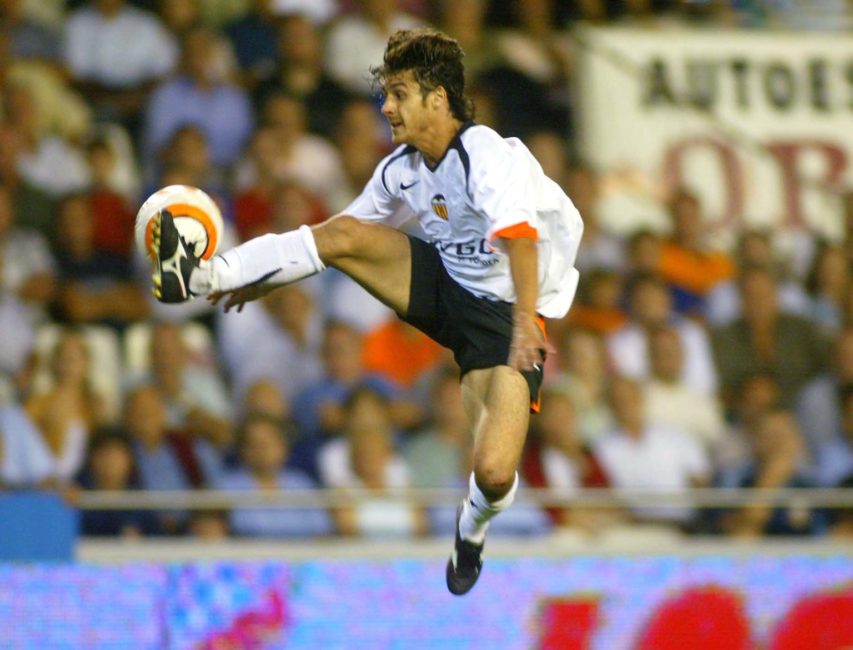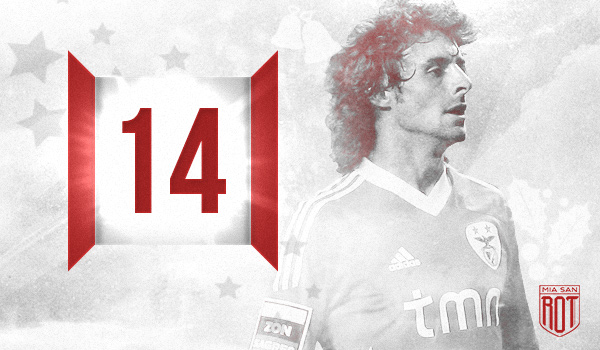The MSR advent calendar: Our favorite signings that never happened: Door 14 – Pablo Aimar
The chronology of a catastrophic misjudgement
In order to make it clear why I watched Bayern’s ultimately unsuccessful efforts to sign Pablo Aimar, the playmaker of Valencia FC, with deep resignation in the summer of 2006, I would first like to chart the chronology of a legendary mistake made by FC Bayern.
- November 2005: At the annual general meeting, FC Bayern withdraws the offer to extend Michael Ballack’s expiring contract to thunderous applause. Uli Hoeneß and Karl-Heinz Rummenigge are visibly incensed at how a player can dare not to regard FC Bayern as the absolute non-plus-ultra in world football.
- January 2006: The club signs Paraguayan talent Julio dos Santos. Some media coin the term “Ballack successor”.
- May 2006: Striker Roque Santa Cruz replaces the suspended Michael Ballack in the offensive midfield in the Bundesliga match against VfB Stuttgart. After the match, Uli Hoeneß is enthusiastic: “We played very differently today. When Michael Ballack is not there, we play with more short and low balls because Michael is by far the best header of the ball. We try to combine more and play in a controlled fashion.”
- Meanwhile, the club seems to be in no hurry to look for a potential Ballack successor. With the exception of rather incidental contacts to players like Hertha’s Baştürk, the club bosses indulge in conspicuous inactivity. They obviously want to prove that Michael Ballack had no special role in the squad and can easily be replaced internally.
- Ballack, meanwhile, signs for English champions Chelsea.
- World Cup 2006: The football world is enthusiastic about the new, fresh, attack-minded Germany. At the same time, it is hard to overlook the fact that this new generation does not have the quality of past years. Philipp Lahm and Miroslav Klose show glimpses of highest quality, but are still untested internationally. The only one who really exudes proven world class is Michael Ballack.
- Summer 2006: Santa Cruz tells to the media that he is ready to become the next Ballack. At the same time, however, he claims that as a trained center-forward he actually has a different skillset.
- End of July: Pablo Aimar moves to upstarts Real Zaragoza for €11m. Although two midfielders, Ballack and Zé Roberto, have left the club, there have been no new arrivals in midfield. Only the name of Ruud van Nistelrooy is making the rounds in the media, even though Bayern have already signed a new striker in Lukas Podolski.
- August: The Bundesliga starts, Bayern get off to a good start with seven points from the first three games, but there is nothing free-flowing about their game. Against promoted side Bochum, Lahm has to pull the coals out of the fire with one of his rare goals, and at home against Nürnberg they only manage a goalless draw.
- Meanwhile, there is no sign of Santa Cruz in the central playmaker position. He is used alongside Roy Makaay up in front, and at the end of the season FC Bayern and the popular Paraguayan should go their separate ways.
- Instead of a diamond with the “most goal-getting midfielder in Europe”, the physical break-up players Demichelis and Ottl play. The club realises that they have underestimated Michael Ballack’s departure. Shortly before the transfer deadline, they sign “aggressive leader” Mark van Bommel.
- The Bayern team loses its first match with van Bommel despite a goal from the Dutch newcomer. Van Bommel is by far Bayern’s best midfielder for the rest of the season, but the club continues to slide down the table.
- On matchday 19, when the future champions VfB Stuttgart move above Bayern in the table and knock them out of the Champions League places, the Bayern bosses sack the two-time double winning coach Felix Magath, who is succeeded by his predecessor: Ottmar Hitzfeld.
- But even Hitzfeld can’t stop the downward slide, losing the first game 3-0. The club never manages to get close to third place again, missing out on the Champions League for the first time since the 1994/95 season.
Brutal consequences and a missed alternative
So far, so bad, but what does all this have to do with our favorite non-signings? That the 2006/07 season was a middling disaster is hardly news, so why am I harping on about it here?
I do it to illustrate how the undesirable trajectory this season took came about almost by necessity. Because it was obvious months before the league kicked off for the new campaign what a terrible idea it was to simply replace such a crucial player as Michael Ballack internally.
As popular as Mark van Bommel is among fans and as successful as his time at the club might have been, he was not a sufficient replacement for Ballack all by himself. The two may share the physicality, the fighting spirit, the leadership qualities, and the ability to strike from distance, but they differ immensely in terms of their playing style.
Contrary to Uli Hoeneß’ disparaging analysis, Michael Ballack was in fact much more than a good header of the ball, he was also a passer, a creative mind. Different, perhaps, from other classic number 10s of his era such as Diego, Lincoln or van der Vaart. Different also from modern passing machines like Kimmich or Modrić, Ballack was nevertheless Bayern’s creative core, an offensive all-rounder who was responsible for everything in Bayern’s forward game. Not having replaced him with an external creative midfielder cost Bayern the season and participation in the Champions League.

(Image: Luis Bagu/Getty Images)
And that brings us, finally, to Pablo César Aimar. Because he symbolises the fact that things could be different. Aimar is probably the most unknown, most forgotten player in our advent calendar this year.
Even though he might not be a household name for many, it is actually terribly easy to describe him: He is a classic number 10. That’s it, that’s all you really need to know to know his style of play. If you put together all the clichés that immediately pop into your head when you hear the term “ten”, you almost exactly get Pablo Aimar. He is small, lanky, technically immensely gifted, the man for the quick, magical dribble and the final, magical pass.
Despite his undoubted qualities, he has had to spend his entire career in the shadow of Román Riquelme, who is almost the same age, whether in Argentina’s domestic league, later in Spain, or even in the national team. When one thought of an Argentine playmaker in the 2000s, Riquelme’s image was bound to jump to mind first.
And this despite the fact that Aimar was far more successful in European club football and only marginally inferior to him in other respects. In his five and a half years at the club, Valencia experienced their most successful era in post-war football. At a time when teams outside the country’s two largest metropolises could still celebrate domestic and international successes every now and then, he won two championships and the UEFA Cup with Valencia. In addition, a then 21-year-old Aimar played one half in the 2001 Champions League final in Milan. But this legendary evening was not to be under the sign of the bat.
With the departure of championship coach Rafael Benítez in 2004, Valencia’s sporting fortunes also took a downward turn, and at one point they even missed out on international competition altogether. So it was clear that Aimar would be on the market after his participation in the World Cup in Germany (as was so often the case, Riquelme’s shadow man mostly found himself on the bench).
The diagnosis for Bayern: lack of creativity
That FC Bayern needed a therapy became clear after the 2006/07 season: Demichelis, van Bommel, Ottl, Hargreaves, there was too much fight and too little creativity. Since Bastian Schweinsteiger was still looking for his best position at the time, it felt as if the only player with the ability to play a lethal pass was Sebastian Deisler, and for well-known reasons he retired from football for good that very winter.
The following year, the club bosses were expected to remedy the lack of creativity on the pitch, and with the return of Zé Roberto, van Bommel was given a creative mind to work alongside of. It is no coincidence that van Bommel’s best times at the record champions were when he played alongside such creative players, whether it was the Brazilian or later Schweinsteiger.
And even if the other players besides the returnee were probably chosen more for their names than for their qualities on the ball, they serendipitously helped solve the lack of creativity, too: Not just any winger came in for the left wing, but the playmaker in disguise per se, Franck Ribéry. And even Miroslav Klose, with his playmaking ability, was one of the most creative strikers in the world at that time. They all went a long way to bringing the joy of playing back to the Isar.
A joy that should never have been lost in the first place. My dream signing Pablo Aimar is the rare pie in the sky where everything actually seemed so perfect that even now, almost 15 years after the fact, I still mourn this missed opportunity when I reminisce about it.
He was the perfect type of player to alleviate all the Bavarian struggles, especially as a duo with van Bommel. At 27, he had already proven himself at a high level, but was still at the perfect footballing age without having moved out of reach in the transfer market food chain yet.
I could have talked here about the above-mentioned Román Riquelme because as a big name in the football world he might have seemed more “Bayern-like”. But he had just almost single-handedly led his club Villarreal to the Champions League final and played a strong World Cup immediately afterwards. It is questionable whether he would have wanted to transfer that summer at all, and in addition his market value peaked in the summer of 2006.
In general, many desired transfers fail in the end for financial considerations; waving goodbye to a very young Agüero for €16m may be regrettable from today’s perspective, but it was understandable at the time. Deco might have been the reigning Champions League winner, but the transfer record he set the year before would have had to be broken again by a few million. Aimar, however, was on the market for €11m, which was less than Bayern had paid for centre-back Lúcio two years earlier.
And yet they were never interested in him. Apart from Bernd Schuster, there is no one who ever put FC Bayern in touch with Pablo Aimar. So they went into the disaster of the 2006/07 season with their eyes wide open, at the end of which they could only qualify for the UEFA Cup.
In fact, I don’t think Aimar would have saved everything as some kind of Superman. It speaks volumes that absolutely no one has ever shed a tear for Felix Magath, even though he was the first coach ever to win two domestic doubles in a row. This particular problem area would be solved at some point, and the quality of the squad was simply overrated in many positions. But with Aimar, at least the season would not have been lost on the transfer market already before a single ball was kicked. With him the worst could have been averted, and perhaps the team could have avoided the equally beloved and hated “Cup of Losers”.
For the next door, we will change the tune a little and hanker after a coach for a change! And maybe his signing might not forever have to be written in the conditional mood?





